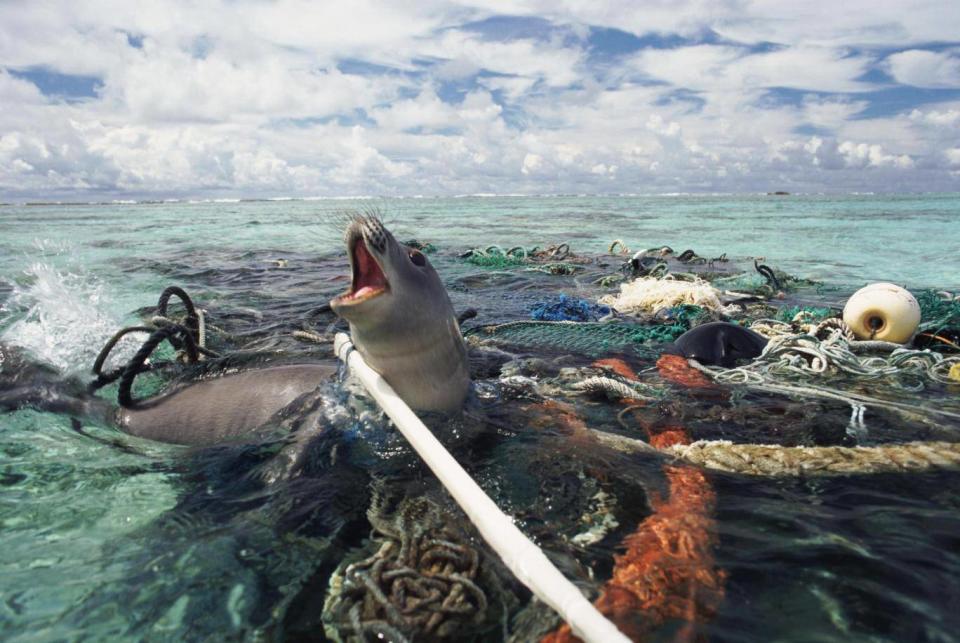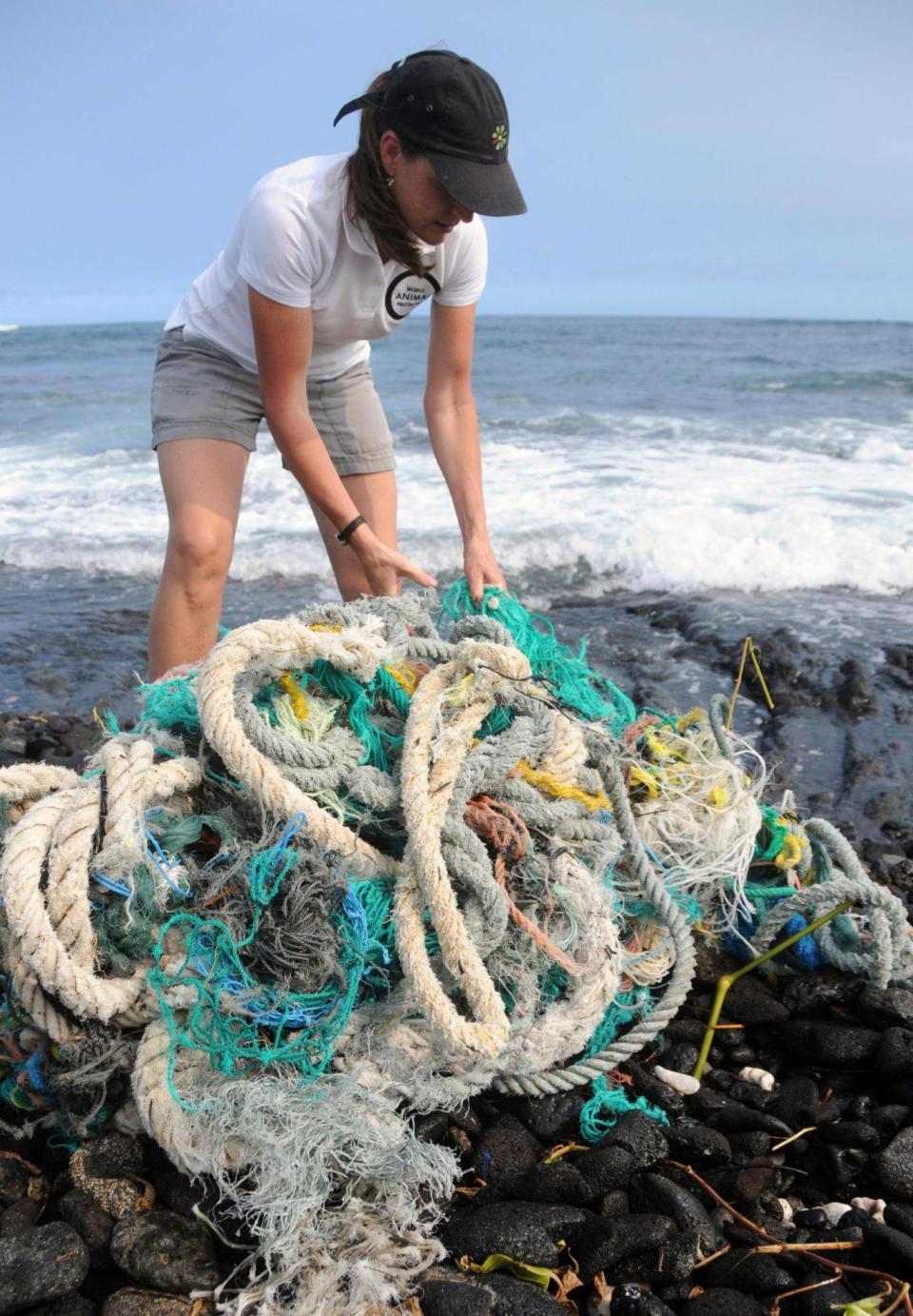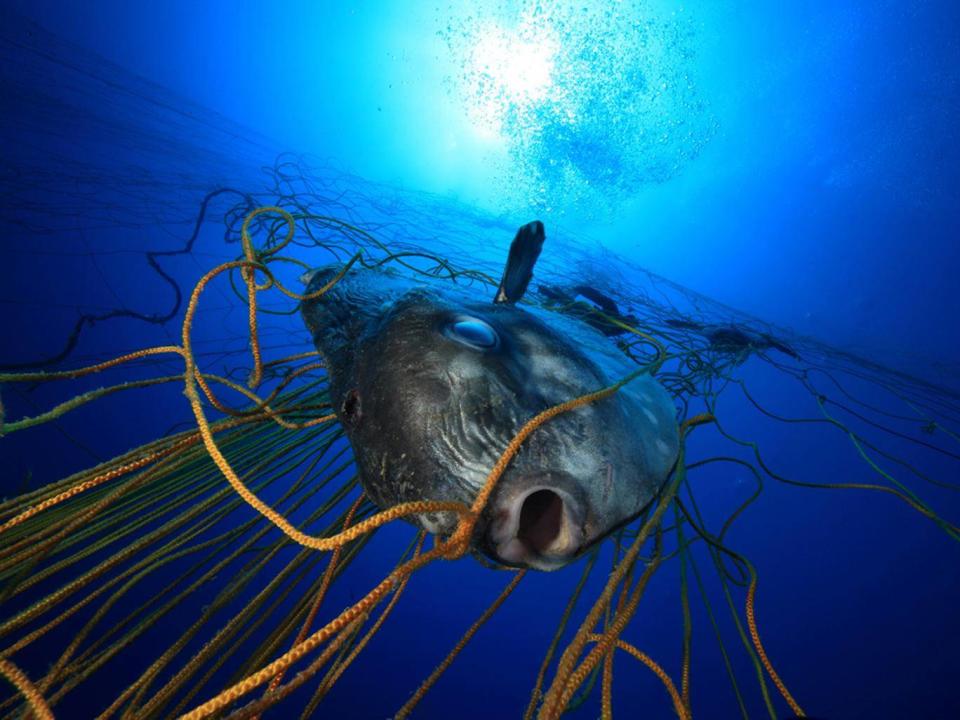Seafood giants 'let thousands of whales, dolphins and seals die in agony each year from discarded fishing equipment'
The world’s biggest seafood firms are all contributing to the deaths of more than 100,000 whales, dolphins, seals, turtles and seabirds that are killed in agony every year by discarded fishing equipment, according to a new report.
Many of the creatures are drowned, strangled or mutilated by plastic gear lost or abandoned at sea, while others suffer “a prolonged and painful death, usually suffocating or starving” either because they cannot fish or their stomachs are full of plastic.
Campaigners believe the fishing litter problem is becoming so bad that the oceans could end up unable to provide any catches for humans to eat.
They say “ghost gear” has become a huge but overlooked threat to marine life, and 640,000 tons of it are added to the oceans each year – a rate of more than a ton every minute.
A new study analysed the approaches to fishing equipment of the world’s 15 biggest seafood companies, to rank them in five categories – but found that none could be ranked in the top two as having “best practice” or making “responsible handling” of their fishing gear integral to their business strategy.
Britain’s best known seafood giant, Young’s, was ranked in the third category, suggesting it has “work to do”.
World Animal Protection (WAP), which carried out the research, called on the Government to amend its 25-year environment plan, produced in January, to include reducing the marine plastic nuisance.
And the charity is also pressuring supermarkets to demand their suppliers clamp down on discarding the plastic and nylon nets, lines and traps that can take up to 600 years to decompose in water.
It comes after Greenpeace discovered microplastics in remote Scottish waters, which it says threaten basking sharks, gannets, puffins, razorbills and shearwaters.
In bad storms fishermen are sometimes forced to abandon gear worth thousands of pounds. But much of the ghost gear comes from illegal fishing: as unregulated crew try to avoid detection in a hurry, they are more likely to discard tackle and lines in the sea, and they don’t use marked gear.
World Animal Protection says that around the world, ghost gear made of non-biodegradable plastic and nylon kills millions of fish, with up to 30 per cent of the decline in some fish stocks attributed to it

This is in addition to the more than 100,000 whales, dolphins, seals and turtles killed. And more than seven in 10 entanglements of ocean wildlife involve plastic ghost gear such as lobster pots.
The report, entitled Ghosts beneath the Waves, says abandoned and lost gear is four times more likely to trap and kill creatures than all other forms of marine debris combined, and more than 70 per cent of visible plastic in the sea is fishing-related.
The problems also include:
Seabirds making nests with small pieces of netting and becoming entangled
Young seals playing with fishing nets that tighten around their necks or flippers
Whales, dolphins, porpoises and endangered leatherback turtles being tangled up as they swim in floating ropes, nets and lines, leading them to drown or starve
Microplastics – minuscule pieces – were found in the digestive tracts of 80 per cent of seals tested off the coast of Ireland, while other research cited found that plastic accounted for 69 per cent of the debris ingested by whales. Other studies said 98 per cent of whale entanglements involved ghost gear, while 82 per cent of North Atlantic right whales have become entangled at least once.
“This is a huge crisis of animal suffering, yet hardly anyone is talking about it,” said World Animal Protection.
In one deep water fishery in the north east Atlantic 25,000 nets have been recorded as lost or discarded each year, according to the report.
“Even within small areas, the amount of ghost gear can be staggering,” it said. “The Florida Keys National Marine Sanctuary, for example, is estimated to be littered with 85,000 active ghost lobster and crab pots.
“Already threatened ecosystems, including shallow coral reef habitats, also suffer further degradation from ghost fishing gear. It undermines the viability of our fisheries too, as it catches and kills an enormous volume of seafood.”

In a foreword to the WAP report, the Belgian Deputy Prime Minister, Didier Reynders, said the deadly amounts of equipment being discarded were rising and could leave the seas barren.
“The enormous impacts of ghost gear spell out the need for urgent attention: if this deadly threat to our oceans, marine animals and ecosystems is not addressed, there is a great risk that that ghost gear will interact and combine with other current oceanic threats to create what the UN termed ‘a destructive cycle of degradation’. Ultimately this could mean our oceans simply stop providing for humans in the many ways we now rely on them,” he wrote.
“Worryingly, the level of ghost gear has increased in recent years and it is likely to grow further as fishing efforts intensify all over the world. Effective solutions are being found locally and nationally, yet I believe only a global approach can enable us to monitor and fight this threat.”
WAP found the average score in its survey on corporate responsibility was just 22 per cent, and fewer than half effectively addressed marine litter or entanglement.
Just three companies – Young’s Seafood, TriMarine and Thai Union - have established policies on lost and abandoned fishing gear, the survey found. Young’s supplies about 40 per cent of all the fish eaten in the UK, and Thai Union owns the John West brand.
Bumble Bee Seafoods, one of America’s largest seafood companies, which sells canned and pouched tuna, salmon and sardines, was among the companies showing “limited published evidence of implementing changes”.
Nearly 50,000 people have signed a World Animal Protection petition calling on supermarkets to pressure their suppliers to act responsibly. So far, only Sainsbury’s has fully committed, the group says.

Last year, the Department for Environment, Food and Rural Affairs announced the Government would join the Global Ghost Gear Initiative (GGGI), a group founded by World Animal Protection to address the fishing litter issue.
World Animal Protection has also written to the admirals of the world’s 10 most powerful navies calling on them to increase patrols to combat illegal and unregulated fishing.
But the problem is also a local one, with fish killed and maimed by discarded tackle and lines from hobby anglers. David Jones, a volunteer diver with charity Neptune’s Army of Rubbish Cleaners, in Pembrokeshire, said seeing a fish caught on a recreational angler’s hook that had broken off in water was difficult.
“You can see the animal is suffering – if it was happening on land to our pets there’d be uproar,” he said. “But it’s always out of sight, out of mind. It’s never a nice experience to see.” The charity has been building relations with local fishermen to encourage them to report lost gear so their divers can try to retrieve it.
Young’s Seafood is a signatory to the GGGI but declined to give The Independent a comment on the criticism in the report.
A Thai Union spokesman said the company was aware of the issue of abandoned, lost and discarded fishing gear. “In fact we plan to make an important announcement on Monday at the Seafood Expo North America in Boston about a new partnership to help Thai Union take a leadership role in addressing this urgent issue,” he said.
The Independent has contacted Beaver Street Fisheries and Bumble Bee but has not yet received a response.

 Yahoo News
Yahoo News 
